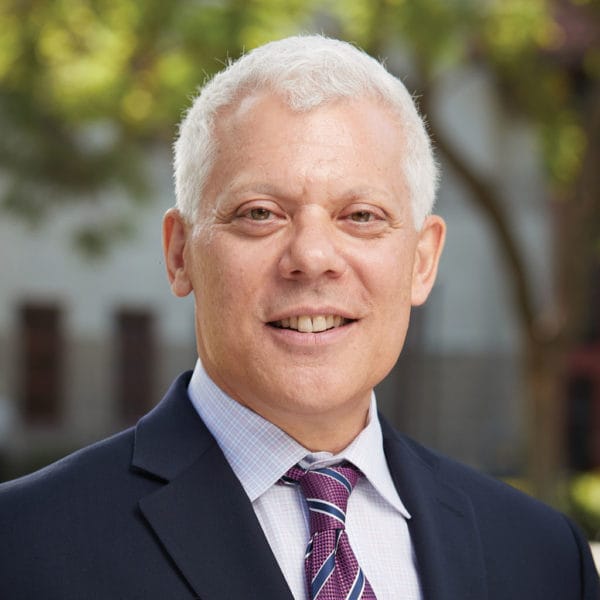Allen M. Omoto is the CGU Associate Provost for Academic Affairs, a professor in the Department of Psychology, and the director of the Institute for Research on Social Issues. He is a social psychologist whose research interests focus on the social and psychological aspects of prosocial behavior and civic and political engagement, including volunteerism. He also conducts research on issues related to the environment, HIV disease, and lesbian, gay, and bisexual (LGB) concerns. His research findings have been published in scholarly journals and book chapters, and his work has been supported by federal and foundation grants.
Omoto earned his BA with honors from Kalamazoo College in Kalamazoo, Michigan, and his PhD from the University of Minnesota. He has been a faculty member at CGU since fall 2000. Among other honors, he has received a Distinguished Contribution to Education and Training Award from the Society for the Psychological Study of Lesbian, Gay, and Bisexual Issues; a Distinguished Service Award from the Society for the Psychological Study of Social Issues; the Western Psychological Association’s Social Responsibility Award; and an Outstanding Achievement Award from the Committee on Sexual Orientation and Gender Diversity of the American Psychological Association. He also has served as President of the Society for the Psychological Study of Social Issues and as President of the Society for the Psychological Study of Lesbian, Gay, and Bisexual Issues, as well as on several governance boards and committees of the American Psychological Association.
At CGU, Omoto supervises research and actively advises and mentors graduate students one-on-one and in project teams. He takes on new MA and PhD students each year and works with them on a variety of research topics. He teaches courses on social psychological theory and history as well as on interpersonal processes, sexuality and gender, grant writing, psychology and social policy, and a transdisciplinary course on civic engagement and civil society.
In recent research funded by the National Institute of Mental Health, Omoto and his collaborators conducted a multi-year, multi-site field-based intervention study of psychological sense of community among people affected by HIV disease. In addition, Omoto and his students have used qualitative and quantitative methodologies to investigate motives for and effects of volunteering and political involvement among diverse adults; ethnic group differences in and the impact of environmental engagement; and stress, resilience, and health among LGB immigrants (funded by the National Institute of Child Health and Human Development). In a current multi-year project funded by the U.S. Department of Defense, Omoto and his collaborators and students are investigating the social challenges and supports of LGB military service personnel and the roles these social factors play in health, job performance, and force readiness.
*indicates current or former CGU student
Co-authored with Matthew T. Ballew*. “Absorption: How nature experiences promote awe and other positive emotions.” Ecopsychology 10 (2018): 26-35.
Co-authored with Coral M. Bruni*, Patricia L. Winter, P. Wesley Schultz, and Jennifer J. Tabanico. “Getting to know nature: Evaluating the effects of the Get to Know program on children’s connectedness with nature.” Environmental Education Research 23 (2017): 43-62.
Co-authored with Cody D. Packard*. “The power of connections: Psychological sense of community as a predictor of volunteerism.” Journal of Social Psychology 156 (2016): 272–90.
Co-authored with Mark Snyder and Patrick C. Dwyer. “Volunteerism: Multiple perspectives on benefits and costs.” In The Social Psychology of Good and Evil (2nd ed.), edited by Arthur G. Miller, 467-93. New York: The Guilford Press, 2016.
Co-authored with Matthew T. Ballew* and Patricia L. Winter. “Using Web 2.0 and social media technologies to foster proenvironmental action.” Sustainability 7 (2015): 10620–48.
Co-authored with Nicole N. Gray* and David M. Mendelsohn*. “Community connectedness, challenges, and resilience among gay Latino immigrants.” American Journal of Community Psychology 55 (2015): 202–14.
Co-authored with Justin D. Hackett* and Miriam M. Matthews*. “Human rights: The role of psychological sense of global community.” Peace & Conflict: Journal of Peace Psychology 21 (2015): 47–67.
Co-authored with Sarah C. Boyle*. “Lesbian community oughts and ideals: Normative fit, depression, and anxiety among young sexual minority women.” Psychology of Women Quarterly 38 (2014): 33–45.
Co-authored with Patrick C. Dwyer and Mark Snyder. “When stigma-by-association threatens, self-esteem helps: Self-esteem protects volunteers in stigmatizing contexts.” Basic and Applied Social Psychology 35 (2013): 88–97.
“Social policy: Barriers and opportunities for personality and social psychology.” In The Oxford Handbook of Personality and Social Psychology, edited by K. Deaux and M. Snyder, 804–29. New York: Oxford University Press, 2012.
Civic Engagement & Civil Society
Gender and Sexuality
Grant Writing
Interpersonal Processes
Overview of Social Psychology
Psychology & Social Policy
